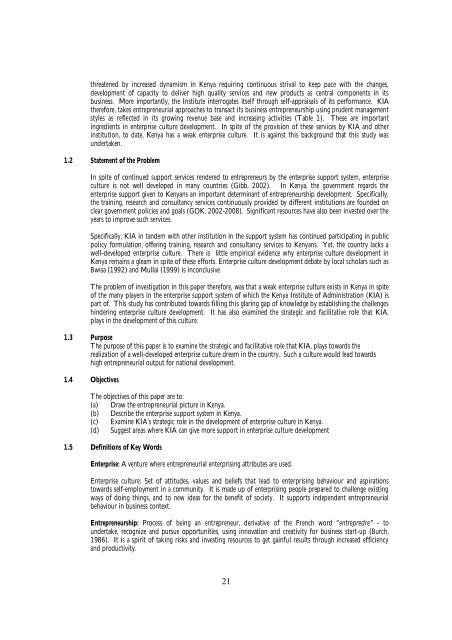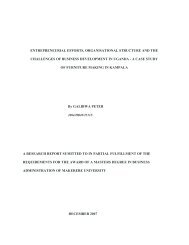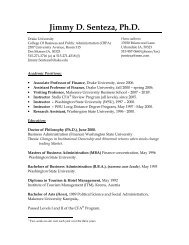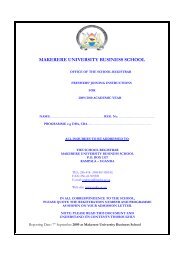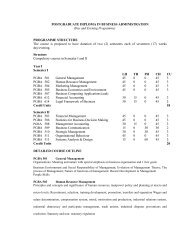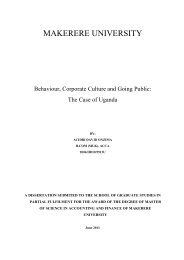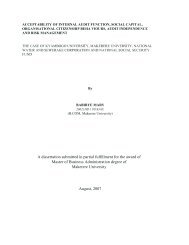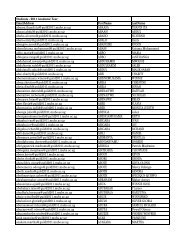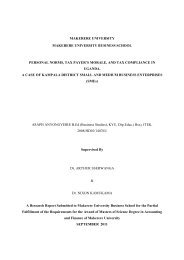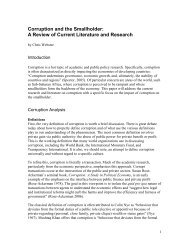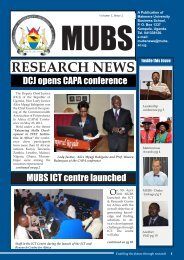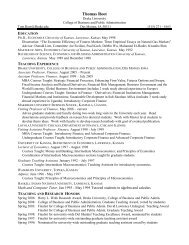13th Annual International Management Conference Proceeding
13th Annual International Management Conference Proceeding
13th Annual International Management Conference Proceeding
You also want an ePaper? Increase the reach of your titles
YUMPU automatically turns print PDFs into web optimized ePapers that Google loves.
threatened by increased dynamism in Kenya requiring continuous strival to keep pace with the changes,<br />
development of capacity to deliver high quality services and new products as central components in its<br />
business. More importantly, the Institute interrogates itself through self-appraisals of its performance. KIA<br />
therefore, takes entrepreneurial approaches to transact its business entrepreneurship using prudent management<br />
styles as reflected in its growing revenue base and increasing activities (Table 1). These are important<br />
ingredients in enterprise culture development. In spite of the provision of these services by KIA and other<br />
institution, to date, Kenya has a weak enterprise culture. It is against this background that this study was<br />
undertaken.<br />
1.2 Statement of the Problem<br />
In spite of continued support services rendered to entrepreneurs by the enterprise support system, enterprise<br />
culture is not well developed in many countries (Gibb, 2002). In Kenya, the government regards the<br />
enterprise support given to Kenyans an important determinant of entrepreneurship development. Specifically,<br />
the training, research and consultancy services continuously provided by different institutions are founded on<br />
clear government policies and goals (GOK, 2002-2008). Significant resources have also been invested over the<br />
years to improve such services.<br />
Specifically, KIA in tandem with other institution in the support system has continued participating in public<br />
policy formulation, offering training, research and consultancy services to Kenyans. Yet, the country lacks a<br />
well-developed enterprise culture. There is little empirical evidence why enterprise culture development in<br />
Kenya remains a gleam in spite of these efforts. Enterprise culture development debate by local scholars such as<br />
Bwisa (1992) and Mullai (1999) is inconclusive<br />
The problem of investigation in this paper therefore, was that a weak enterprise culture exists in Kenya in spite<br />
of the many players in the enterprise support system of which the Kenya Institute of Administration (KIA) is<br />
part of. This study has contributed towards filling this glaring gap of knowledge by establishing the challenges<br />
hindering enterprise culture development. It has also examined the strategic and facilitative role that KIA,<br />
plays in the development of this culture.<br />
1.3 Purpose<br />
The purpose of this paper is to examine the strategic and facilitative role that KIA, plays towards the<br />
realization of a well-developed enterprise culture dream in the country. Such a culture would lead towards<br />
high entrepreneurial output for national development.<br />
1.4 Objectives<br />
The objectives of this paper are to:<br />
(a) Draw the entrepreneurial picture in Kenya.<br />
(b) Describe the enterprise support system in Kenya.<br />
(c) Examine KIA’s strategic role in the development of enterprise culture in Kenya.<br />
(d) Suggest areas where KIA can give more support in enterprise culture development<br />
1.5 Definitions of Key Words<br />
Enterprise: A venture where entrepreneurial enterprising attributes are used.<br />
Enterprise culture: Set of attitudes, values and beliefs that lead to enterprising behaviour and aspirations<br />
towards self-employment in a community. It is made up of enterprising people prepared to challenge existing<br />
ways of doing things, and to new ideas for the benefit of society. It supports independent entrepreneurial<br />
behaviour in business context.<br />
Entrepreneurship: Process of being an entrepreneur, derivative of the French word “entrepredre” - to<br />
undertake, recognize and pursue opportunities, using innovation and creativity for business start-up (Burch,<br />
1986). It is a spirit of taking risks and investing resources to get gainful results through increased efficiency<br />
and productivity.<br />
21


